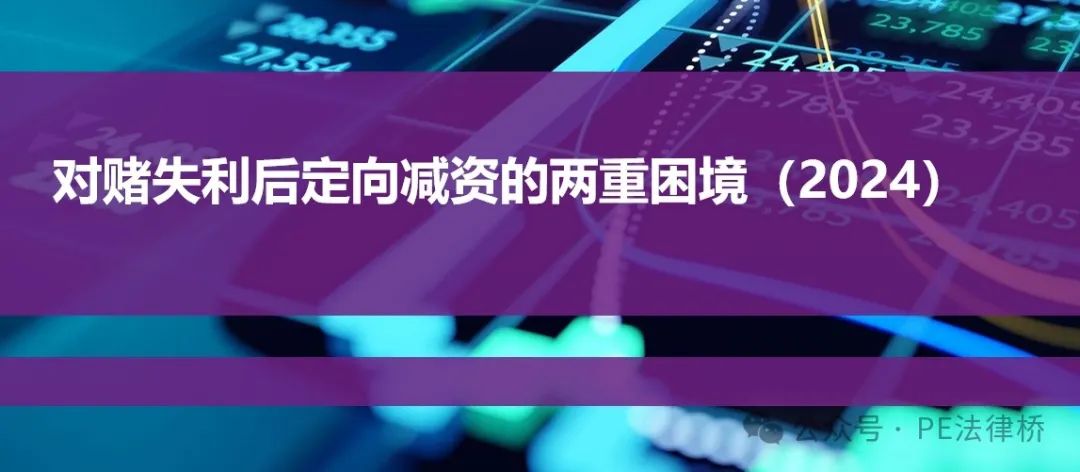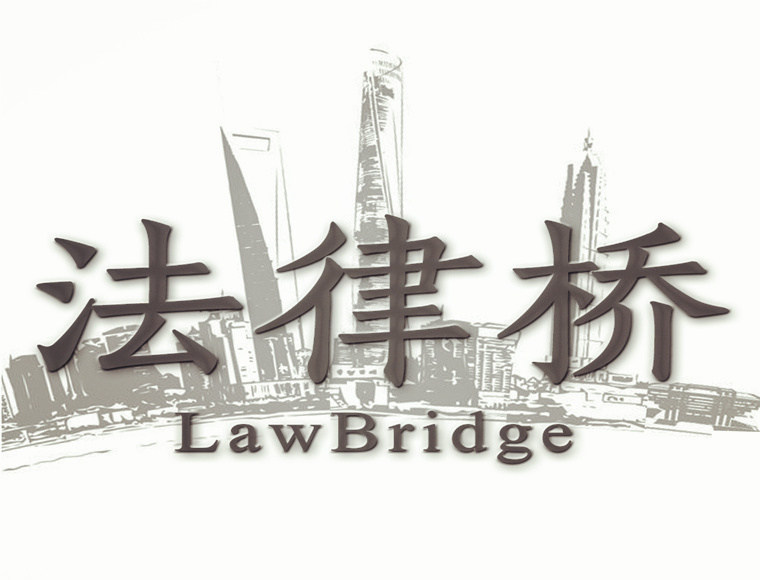The double dilemma of targeted capital reduction after gambling failure (2024)

One of the author's venture capital clients (hereinafter referred to as "Company A") recently received a notice of a shareholders' meeting from the invested company B. The company plans to implement a targeted capital reduction to fulfill its equity return under the gambling agreement. purchase obligation. Company A then asked the author whether the targeted capital reduction in this situation was legal and what countermeasures should be taken.
It is understood that: Company A made an equity investment in Company B 8 years ago, and Company B has since conducted three rounds of equity financing. In the last round of equity financing, Company B and its founding shareholders did so without the knowledge of some shareholders. The company signed a gambling agreement with Company C, a private equity investment institution (hereinafter referred to as the "PE investment institution"), but Company B failed to go public as scheduled. Company C then required Company B and its founding shareholders to perform the repurchase under the gambling agreement. obligation. The founding shareholder was unable to fulfill its repurchase obligation, so he negotiated with Company C to have Company B repurchase its equity. Therefore, Company B, under the control of the founding shareholders, plans to conduct a targeted capital reduction and return the investment to Company C and pay the agreed income as stipulated in the gambling agreement.
After understanding the case, the author believes that Company B’s plan to conduct a targeted capital reduction due to fulfilling its equity repurchase obligations involves two focus issues: First, can Company B implement a targeted capital reduction? That is, can Company B reduce its capital by only returning the capital increase to Company C so that Company C can withdraw from Company B? Second, can Company B return the investment to Company C with capital reserves and pay the agreed income?
01
The validity and enforceability of gambling agreements
As a valuation adjustment mechanism, the VAM agreement has almost become a must-have clause for private equity investment. The judiciary and private equity circles have a positive attitude towards the effectiveness of gambling between PE investment institutions and shareholders or actual controllers of invested companies. However, as for the effectiveness of gambling between PE investment institutions and invested companies [1], from the "Haifu Case" "As for the "Hua Gong Case", the judicial community has been exploring, and it was not until the Supreme People's Court issued the "Minutes of the National Courts' Civil and Commercial Trial Work Conference" on November 14, 2019 (called the "Nine People's Minutes" in the industry) that the final decision was made . According to the "Nine People's Minutes", if a PE investment institution bets with the invested enterprise, the betting agreement will be valid as long as there are no statutory invalid reasons.
However, while affirming the effectiveness of the gambling agreement, the "Nine People's Minutes" further clarified:
“If an investor requests the target company to repurchase equity, the People’s Court shall comply with the mandatory provisions of Article 35 of the Company Law on “Shareholders shall not withdraw capital” [2] or Article 142 of the Company Law on share repurchase. [3] Conduct review. If, after review, the target company has not completed the capital reduction procedure, the People’s Court shall reject its claim.”
In other words, based on the principle of capital maintenance, if a PE investment institution requires the invested company to repurchase its equity, it can only do so through a targeted capital reduction by the invested company, so that the PE investment institution with the right to request the repurchase will withdraw.
According to the provisions of the Company Law, capital reduction is a special resolution matter and must be approved by shareholders representing more than two-thirds of the voting rights [4]. In practice, PE investment institutions usually only hold a relatively low proportion of the equity of the invested company (generally no more than 30%). Without a special agreement on voting rights, the PE investment institution cannot alone promote the invested company to reduce capital. resolution. If the invested company makes a resolution to reduce capital, it must be the result of consensus between the PE investment institution and other major shareholders (usually the founding shareholders). In this case, the PE investment institution does not need to request a repurchase through litigation or arbitration. In other words, if a PE investment institution initiates litigation or arbitration, it is usually a last resort after efforts by multiple parties to negotiate have failed. Therefore, the "Nine People's Minutes" seems to confirm the validity of the gambling agreement, but it has no practical significance for PE investment institutions.
02
The effectiveness of the resolution on targeted capital reduction
As mentioned above, if the conditions for equity repurchase are triggered, according to the "Nine People's Minutes", it can only be achieved through targeted capital reduction. However, as my client asked, how effective is such a capital reduction resolution? Will it harm the interests of other shareholders other than the parties to the gambling agreement?
In the dispute between Chen Mouhe and Jiangyin XX Industrial Co., Ltd. over the confirmation of the validity of company resolutions, the court of first instance held that according to Article 34 of the Company Law [5], "same shares, same rights" is the exercise of assets by shareholders of a limited liability company. As for the basic principles of income rights, unless otherwise stipulated in the company's articles of association or unanimously agreed by all shareholders, the company's capital increase and dividend distribution should follow the above principles. The legal nature of the capital reduction by the company's shareholders is the same as the capital increase by the company's shareholders. Without the unanimous consent of all shareholders, the capital reduction is not carried out in the same proportion of equity shares, which violates the general principle of "same shares, same rights" for shareholders of a limited liability company, and directly harms other shareholders. The property rights and interests of shareholders shall be deemed invalid.
The court of second instance held that the "Company Law" stipulates that a resolution to reduce the registered capital made at a shareholders' meeting must be approved by shareholders representing more than two-thirds of the voting rights [6]. The "reduction in registered capital" in this regulation only refers to the company's reduction in registered capital, and does not include the distribution of capital reduction among shareholders. Different ratios of capital reduction will directly break the equity distribution situation at the time of the company's establishment. If it is passed by shareholders with more than two-thirds of the voting rights, the resolution of different ratios of capital reduction can be made. In fact, it will change the company's establishment conditions in the form of a majority vote. The equity structure is formed by the unanimous decision of the promoters. Therefore, capital reductions of different ratios must be unanimously approved by all shareholders, unless all shareholders agree otherwise. In addition, when the company is in a state of loss, different ratios of capital reductions lead to an increase in the shareholding ratio of some shareholders, which essentially increases the risks borne by the shareholders and damages the interests of the shareholders. Major shareholders take advantage of their advantageous position to pass resolutions on capital reductions at different ratios in the form of a majority vote, which violates the provisions of the Company Law that "shareholders shall not abuse their rights to harm the interests of the company or other shareholders" [7]. Therefore, the court of second instance also determined that the resolution on capital reduction at different ratios in this case was invalid.
In the case of a company resolution dispute between Hua Mouwei and a Shanghai e-commerce Co., Ltd., the court of second instance also held that the targeted capital reduction would directly break the equity distribution situation at the time of the company's establishment, and the targeted capital reduction resolution violated the equity structure of the company at the time of its establishment. The basic principle of a desirable outcome was therefore found to be invalid. At the same time, the court of second instance also believed that the company was in a state of continuous losses. If the return of investment funds to some shareholders was allowed, it would lead to a large-scale reduction of the company's assets, damage to the company's property and credit foundation, and also damage to the interests of other shareholders of the company and the company's creditors. . Therefore, the company is in a state of continuous losses and the resolution to return investment funds to shareholders is invalid.
The author believes that in private equity investment, when a PE investment institution increases capital to the invested company, all shareholders of the invested company reach an agreement on the equity structure (including capital contribution amount, equity ratio, etc.) by signing a "Capital Increase Agreement". If this needs to be changed, A shareholding structure that is unanimously approved by all shareholders must of course be unanimously agreed upon by all shareholders. The "Company Law" stipulates that capital reduction must require a two-thirds majority vote [8], which stipulates capital reduction in the same proportion on the basis of the same shares and the same rights, and should not be applied to targeted capital reductions. If this provision of the Company Law can be applied to targeted capital reductions, it may happen that when the company has very good profitability, shareholders with more than two-thirds of the voting rights will "kick" small shareholders out of the company through targeted capital reductions. Ridiculous scenario; when the company is in a loss-making situation, shareholders with more than two-thirds of the voting rights can reduce their investment amount through targeted capital reduction and withdraw their investment. This is obviously inconsistent with the original legislative intention of the Company Law. In short, the "Company Law" stipulates that major matters of the company, including capital increase and capital reduction, be decided by special majority vote in order to improve the efficiency of the company's internal governance. If it is a year-on-year capital reduction, all shareholders will receive equal rights. Based on this rule The resolutions made will not infringe the interests of shareholders, but capital reductions at different ratios may cause major shareholders to use their voting advantages to harm the rights and interests of small shareholders.
However, in judicial practice, most judges still mechanically apply the provisions of the Company Law that capital reduction requires a two-thirds majority vote, and believe that as long as the resolution on targeted capital reduction is passed by more than two-thirds of the voting rights, it is valid. , regardless of the underlying legal logic of the provision. Fortunately, the newly revised "Company Law" responds to this. Paragraph 3 of Article 224 of the "Company Law" (2023 revision) stipulates that "a company shall reduce its registered capital in proportion to the capital contribution or shares held by shareholders." Reduce the amount of capital contribution or shares, unless otherwise provided by law, otherwise agreed by all shareholders of a limited liability company, or otherwise provided in the articles of association of a joint stock company." That is to say, in principle, the company should reduce capital in the same proportion. Targeted capital reduction can only be carried out if the law provides otherwise, all shareholders of a limited liability company agree otherwise, or the articles of association of a joint stock company provide otherwise. This provision is almost entirely consistent with the logic of the author’s previous analysis.
In fact, from another perspective, since the "Haifu Case" established the principle that bets between PE investment institutions and invested companies are invalid, PE investment institutions generally will not just bet against the invested companies, but will usually require the invested companies to The founding shareholders or actual controllers jointly bear the responsibility for equity repurchase. Just like the situation encountered by the author's client, Company C was able to push Company B to implement targeted capital reduction precisely because the founding shareholders were unable and unwilling to fulfill their equity repurchase obligations, so they actively cooperated with Company C to avoid their own responsibilities. In this case, the founding shareholder clearly violated Article 20 of the current Company Law, which stipulates that shareholders "may not abuse their rights to harm the interests of the company or other shareholders"[9].
03
The legality of using capital reserves to return investment funds
In the practice of private equity investment, PE investment institutions usually invest in invested companies at high or even high premiums. Only a small part of their investment funds is included in the registered capital of the invested company, and the majority is included in capital reserves. When the conditions for equity repurchase are triggered, can the company use capital reserves to return investment funds to shareholders while reducing capital in a targeted manner?
According to the current provisions of Article 168, Paragraph 1 of the Company Law, capital reserves can only be used to expand production and operations or to increase capital[10], and cannot be used for any other purpose, including returning investment funds to shareholders. . In this regard, the Supreme People's Court clarified in the (2009) Min Er Zhong Zi No. 75 Infringement Dispute Case that the capital reserve fund belongs to the company and is an asset of the company. Shareholders cannot claim that the capital reserve fund corresponds to their shareholding ratio. Part of it belongs to oneself; in (2013) Minshen Zi No. 326 Company Capital Increase Dispute Case, it was clarified that the capital contribution paid by shareholders to the company, whether included in the registered capital or the capital reserve fund, forms the company's assets, and shareholders are not allowed to request return.
According to the provisions of the Company Law, capital reduction refers to the reduction of registered capital and does not include the reduction of capital reserve. Combined with the provisions of Article 168 of the current "Company Law" [11], in the case consulted by the author's client, Company B can make a resolution on targeted capital reduction even if there is no clear provision in the current "Company Law" (and Regardless of its effectiveness), capital reserves cannot be used to return the investment to Company C and pay the agreed income.
In addition, in business practice, if the conditions for equity repurchase are triggered because financial targets are not achieved, it is common for the valuation of the invested company to decline. In this case, targeted capital reduction will inevitably lead to the benefits obtained by the PE investment institution exceeding The property rights corresponding to its shareholding ratio directly harm the interests of other shareholders and even creditors. The founding shareholders' use of their voting rights to promote targeted capital reductions clearly violates Article 20 of the current Company Law, which stipulates that shareholders "must not abuse their rights to harm the interests of the company or other shareholders" [12].
04
To sum up, even in the absence of clear provisions in the current Company Law, the effectiveness of a resolution on targeted capital reduction passed by a majority vote is controversial. According to Article 224 of the Company Law (2023 Revision) According to the provisions of paragraph 3 of this article, if there are no circumstances that comply with the provisions of this paragraph, the resolution on targeted capital reduction will be invalid; on the other hand, it is obviously illegal to directly use capital reserves to return investment funds to PE investment institutions. Therefore, when equity repurchase conditions are triggered, PE investment institutions should strive to implement targeted capital reductions in a manner unanimously agreed by all shareholders. In practice, this type of targeted capital reduction is also called a transactional capital reduction due to conflicts of interest between shareholders. A capital reduction agreement should be signed. On this basis, it is natural to pass a capital reduction resolution. As for the investment funds that have been included in the capital reserve, they should first be used to increase the company's capital in accordance with the provisions of Article 168 of the current "Company Law"[13]. However, when the capital reserve is transferred to increase the company's registered capital, just like reducing capital, one must face the issue of whether to increase the capital in proportion to the shareholding ratio of all shareholders or to transfer it in a targeted manner to the capital contribution of the PE investment institution requesting repurchase. . Under the basic principle of "same shares, same rights" stipulated in the "Company Law", if the capital reserve is directionally converted into the capital contribution of the PE investment institution requesting repurchase, it must be unanimously approved by all shareholders, not just one-third. A majority of two or more shall decide. Otherwise, the absurd scenarios mentioned above will also occur.
As early as 2012, the "Haifu Case" established the principle that bets with invested companies are invalid. Regardless of whether it is reasonable or not, it can at least serve as a warning to private equity funds about the risks. It is recommended that the majority of PE investment institutions choose an appropriate gambling plan based on the actual situation of the company to be invested in to ensure that the gambling agreement is legal, effective and operable. Only by doing a good job in risk control management can PE investment institutions gain a foothold in the increasingly severe market.
[1] For the convenience of writing, unless otherwise specified, the gambling agreements mentioned in the following article refer to the gambling agreements between private equity investment institutions and invested companies.
[2] Refers to Article 35 of the "Company Law of the People's Republic of China" (revised in 2018) (hereinafter referred to as the "current "Company Law"), which is included in the "Company Law of the People's Republic of China" (revised in 2023) (hereinafter referred to as the " The "Company Law" (2023 Revision) is reflected in Article 53.
[3] Articles 161 and 162 of the Company Law (2023 Revision).
[4] Paragraph 2 of Article 43 of the current Company Law and paragraph 3 of Article 66 of the Company Law (2023 revision).
[5] Articles 210 and 227 of the Company Law (2023 Revision).
[6] Article 66 of the Company Law (2023 Revision).
[7] Article 20 of the current Company Law and Article 21 of the Company Law (2023 Revision).
[8] Paragraph 2 of Article 43 of the current Company Law and paragraph 3 of Article 66 of the Company Law (2023 revision).
[9] Article 21 of the "Company Law" (2023 Revision).
[10] Article 214 of the "Company Law" (revised in 2023) allows companies to use capital reserves to make up for losses, but the discretionary reserve fund and statutory reserve fund should be used first; if it still cannot be made up, it can be used in accordance with regulations Capital reserve fund.
[11] Article 214 of the Company Law (2023 Revision).
[12] Article 21 of the "Company Law" (2023 Revision).
[13] Article 214 of the Company Law (2023 Revision).






















































First, please LoginComment After ~